More than 105,000 high school graduates in Turkey have been unable to enroll in a university this year despite being eligible, mainly due to financial difficulties that include the inability to afford housing or basic necessities in another city, Turkish Minute reported.
The number of graduates who were unable to enroll in a university increased by more than 35,000 to 105,772 this year, compared to 2021, Birgün said, underlining that the main reason for the considerable surge in the figure was the country’s deteriorating economy.
According to a study by education specialist Salim Ünsal, 24,544 of the high school graduates couldn’t register in undergraduate programs; 81,228 were unable to register in associate degree programs; and 86,975 didn’t enroll in state universities although they were entitled to, Birgün said.
The main reason for the graduates decision not to enroll in a university this year was financial challenges, Ünsal said, adding that the students themselves are expected to pay for accommodation and expenses in addition to basic needs.
“There aren’t enough KYK [state-run Higher Education Credit and Hostels Institution] dormitories. … Accommodation is the most important [financial] problem since the price of private dormitories and rentals are high. … Those students … will also eat, drink and occasionally visit their families. When you put all this together, it requires a [considerable] budget,” Ünsal said.
He added that other reasons for high school graduates’ decision not to enroll in universities were the decline in their expectations for an advanced education and the fact that they choose universities and departments without proper research and regret their decisions afterward.
Over the past several years Turkey has been suffering from a deteriorating economy, with high inflation and unemployment as well as a poor human rights record. President Recep Tayyip Erdoğan is criticized for mishandling the economy, emptying the state’s coffers and establishing one-man rule in the country where dissent is suppressed and opponents are jailed on politically motivated charges.
A staggeringly high cost of living has become the new normal in Turkey, where recent increases in food and utility prices are pushing up inflation, further crippling the purchasing power of citizens.
Levent Gök, an MP from the main opposition Republican People’s Party (CHP), stated in a parliamentary question in late 2021 that the 2021-2022 academic year had started with university students’ housing problems and that some students hadn’t enrolled or had suspended enrollment because of dormitory fees and house rents that had spiked due to the economic crisis in the country.
The number of students who didn’t enroll in a university despite being entitled to increased by 18,971 in 2021, according to the Council of Higher Education (YÖK), which also said that 2021 saw the lowest number of students entitled to enroll in a university since 2018.
A group of university students calling themselves the “We Can’t Shelter” movement staged their first vigil in Istanbul on Sept. 19, 2021, sleeping outdoors in protest of high dormitory and rental prices. The protests then spread among university students in various cities.
Erdoğan targeted the students during a press conference, saying the protestors “were lying” as there were enough dormitories all across the country.















